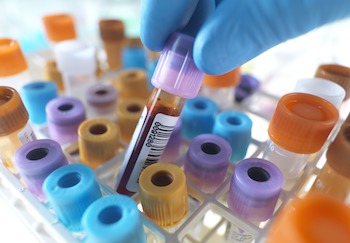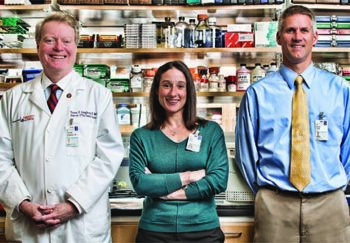
Clinical research is vital to uncovering the causes of disease and finding new treatments or even a cure. For rare diseases like large granular lymphocyte (LGL) leukemia, it’s tricky to perform research with small sample sizes. Clinical trials for LGL leukemia research are exceptionally challenging to fill when there are only about 1,000 people each year receiving this diagnosis — and they’re spread around the world.
LGL Leukemia Research
The UVA Cancer Center is a national leader in LGL leukemia research through its LGL Leukemia Registry. Thomas Loughran, MD, heads the LGL Leukemia Program at UVA Cancer Center and is the doctor who first discovered the disease. His team works with patient samples and is able to translate the knowledge gained in the lab into help for patients. Following an informed consent process, this registry collects blood and tissue sample donations.
These donations are from people who have been diagnosed with the disease or who have a reasonable suspicion that they have the disease. This database of samples allows researchers to use the patient leukemic/cancer cells to examine how the disease works and how treatments affect the disease.
“In terms of finding new treatments and gaining new information about the disease, we are among a limited subset,” says Bryna Shemo, a clinical research coordinator for the LGL Leukemia Registry. “Because the disease is so rare, UVA has most of the information and samples related to the disease. We also received substantial donations from the Bess Family Charitable Fund. Also, a generous anonymous donor to cover expenses associated with the Registry, including personnel as well as costs for the collection, shipment, processing and storage of these samples. Thus, there is no cost to our patient donors.”
How the Samples Are Used
After obtaining informed consent, UVA collects blood and saliva samples from volunteers and stores them in a research lab dedicated to LGL leukemia. The blood sample contains both normal cells and the leukemic LGL (or cancerous) cells and can be collected multiple times. The saliva provides a set of normal cells without any LGL leukemic cells and is only collected one time from a patient.
Comparisons can be made between the leukemic LGL cells, which exhibit genetic changes that are associated with leukemia development, to the normal cells obtained from the saliva. Donors may submit multiple blood samples to the registry at regular intervals or at different points in their disease progression, such as before and after treatment.
“Our lab looks at how the disease state is changing over time,” Shemo says. “As the disease progresses, do the cells release different cytokines? Do the cells change in numbers and profile? Do they look differently when they’ve been in the body for 10 years versus one year?”
Many people with LGL leukemia also have an autoimmune disorder, such as rheumatoid arthritis, though the relationship between these conditions isn’t yet fully understood. With Registry donations, researchers are able to examine the relationship between those diseases and how they affect LGL leukemia progression. All of this work aims to provide more options for people living with LGL leukemia and, hopefully, someday, a cure.
How You Donate to the LGL Leukemia Registry
First, you need to have a diagnosis or a reasonable suspicion of having LGL leukemia. Your doctor can confirm the suspicion with a complete blood count and other tests, such as Flow Cytometry and T-Cell Gene Rearrangement tests on either peripheral blood or bone marrow samples.
Next, call us to speak with a Registry coordinator at (434) 243-8431. This person will talk to you about your disease and allow you to provide informed consent to participate. A copy of the relevant consent form can be found at LGL Leukemia Registry. Next, we work with your doctor to gather the necessary information. This includes the tissue samples and other medical records.
If you live close enough to visit UVA or are able to travel, our Emily Couric Cancer Center provides the opportunity to confirm your LGL leukemia diagnosis, meet with Loughran, speak directly with registry coordinators and donate samples here. For those who are unable to travel to UVA, it is still possible to donate samples from your location. We are happy to send your local doctor the supplies needed to collect and ship your research samples.
When your blood sample arrives in Loughran’s research laboratory, UVA Cancer Center will remove all personally identifying information tied to the samples and assign them a number. This provides you with anonymity in the research process and any future publications of research results.
Why It’s Important to Donate
As you may have already experienced, when you’re diagnosed with a rare disease, it’s hard to learn a lot about your condition. Much of what you learn may come from personal stories and anecdotes from online support groups or discussion boards. Your doctor may have some knowledge of the disease, and Loughran personally consults with physicians around the world. Loughran’s research laboratory shares all publications that result from work on registry samples with:
- Patients
- Registry participants
- Physicians via multiple avenues, including journal access, posting on support group sites and by individual request
Donating tissue samples to the registry is an effective way to put more information into the hands of doctors and patients.
Donate to the Registry
If you’ve been diagnosed with or are suspected of having LGL leukemia, consider donating a sample to the LGL Leukemia Registry.
“We depend greatly on patients to give us materials to study new aspects of the disease,” Shemo says. “Without those donations, we couldn’t do research into LGL leukemia because there are not multiple sources by which we could get these cells. In fact, the LGL Leukemia Registry samples represent a unique resource to enable the acquisition of competitive research grants from organizations such as the National Cancer Institute and the Leukemia and Lymphoma Society, which greatly increase our knowledge of the disease.”
Sharing by patients is one of the best ways to help doctors learn more about a rare disease and help other patients know how to handle their illness. Rick Birn began experiencing symptoms of LGL leukemia in the 1990s, long before many doctors had heard of the disease. He was treated for his symptoms, but after a relapse in 2009, his oncologist suspected LGL leukemia and reached out to Loughran. Birn sent his samples from Canada to UVA to be part of the registry. He encourages others to do the same.
“For rare diseases, the patient’s knowledge and willingness to share experiences is extremely important,” says Birn. “Donate your blood to the registry to help yourself and help others.”

